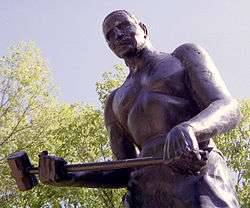John Henryism
John Henryism (JH) is a strategy for coping with prolonged exposure to stresses such as social discrimination by expending high levels of effort which results in accumulating physiological costs.[1][2]

Origins
The term was conceived in the 1970s by African-American epidemiologist and public health researcher Sherman James while he was investigating racial health disparities between blacks and others in North Carolina.
One of the people he interviewed was a black man, who, despite being born into an impoverished sharecropper family and having only a second grade education, could read and write. The man had freed himself and his offspring from the sharecropper system, had 75 acres (30 ha) of farmed land by age 40, but by his 50s, he had hypertension, arthritis, and severe peptic ulcer disease.[2]
His name, John Henry Martin, and his circumstances were evocative of folk hero John Henry, an African American who worked vigorously enough to compete successfully with a steam powered machine but died as a result of his effort.[3][4]
Description
James developed a scale for measuring JH based on agreement with a series of statements such as these:
- "When things don't go the way I want them to, that just makes me work even harder"
- "I've always felt that I could make of my life pretty much what I wanted to make of it."
Effects
Men who scored higher on the John Henry scale were not found to have statistically significant differences in mean systolic blood pressure or mean diastolic blood pressure when compared to their lower scoring counterparts, however a significant effect did emerge in variation in percentage of hypertension. [1] African American males who were categorized as low or medium SES (socio economic status) and had high levels of John Henryism, had a significantly higher % of hypertension than their counterparts with low levels of John Henryism [1], however high SES individuals with high levels of John Henryism were found to have lower levels of hypertension than their low John Henryism, high SES counterparts. [1]
Studies have found that African-Americans with high scores are less likely to be current or former smokers than African-Americans with low JH scores. African-American college students with high JH scores were less likely to have carried a weapon on campus for self-defence, more likely to have been arrested for driving under the influence, and more likely to have missed a class due to alcohol use.[5]
See also
References
- 1 2 3 4 James, S. A.; Keenan, N. L.; Strogatz, D. S.; Browning, S. R.; Garrett, J. M. (1992). "Socioeconomic status, John Henryism, and blood pressure in black adults. The Pitt County Study". American Journal of Epidemiology. 135 (1): 59–67. PMID 1736661.
- 1 2 Steele, Claude M. (2011). Whistling Vivaldi: How Stereotypes Affect Us and What We Can Do (Issues of Our Time). W. W. Norton & Company. ISBN 978-0393341485. Retrieved 2014-11-25.
- ↑ Tracy, Steven C.; Bradford, Roark (2011). John Henry: Roark Bradford's Novel and Play. Oxford University Press, USA. ISBN 0-19-976650-9.
- ↑ "John Henry, Present at the Creation", Stephen Wade, NPR, September 2, 2002
- ↑ Jackson, Yolanda (2006). Encyclopedia of Multicultural Psychology. SAGE Publications Inc. pp. 281–282. ISBN 1412909481.